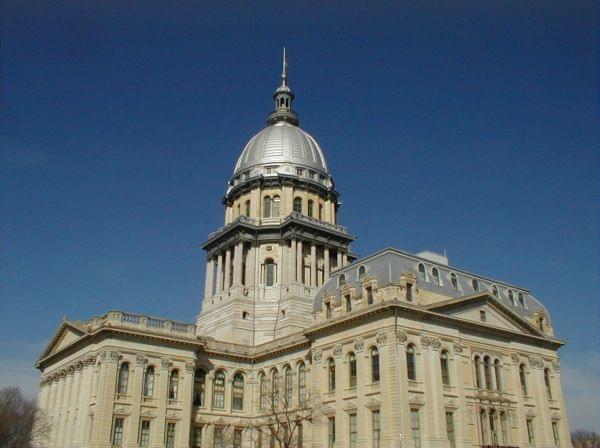Legislators End Regular Spring Session Without Passing Budget

The Illinois State Capitol in Springfield, Ill. (Nikopoley/Wikimedia)
Illinois' budget crisis will continue, unabated. The state General Assembly's regular, spring session came to an end Tuesday night without any resolution to the stalemate that has the state entering its twelfth month without a complete spending plan. There's no plan for next year, either.
Lawmakers spent morning, to midnight at the capitol, passing dozens of bills, and sending them on to the governor, who'll potentially sign them into law.
None of them were budget bills, which means school will have to keep wondering if the state will send money to help them open their doors on time. Community colleges and universities like Eastern, Western and Chicago State will have to keep confronting hard choices about their future, and organizations that rely on state money to support at-risk youth, sexual assault victims, and the elderly will have to keep cutting back, and keep hoping for a breakthrough.
Though the stalemate has dragged on -- longer than most capitol insiders say they'd have ever predicted -- there's a shot the summer could bring about a mini breakthrough.
Tuesday morning, when Gov. Bruce Rauner and the legislative leaders met briefly in private, he pitched a stopgap budget.
And it was a proposal that Democrats were open to getting on board with because, they say, it's not tied to passage of the governor's controversial Turnaround Agenda.
It was a turnaround of its own --- Rauner had dismissed the concept days earlier when it was floated, by Senate President John Cullerton.
"We had a very good meeting with the governor today," said Cullerton. "He started off by complimenting me, which I thought was very nice. He said that I was prescient because I'd suggested that we talk about an interim budget, that would keep the government running, keep the schools open, keep the universities open, keep the social service providers from closing."
The problem was, Democrats say, the offer came too late. Democrats often use their control of the legislature to bend the rules in their favor, but to push through a brand, spanking new plan in a single day -- on the final day of the session -- was impossible.
Instead, Cullerton and House Speaker Michael Madigan say they'd assign a small group of legislators negotiating on larger budget questions, to study it.
The Republican Leaders framed it as another example of Democrats stalling, and trying to, they say "force a crisis."
That sort of fighting between Republicans and Democrats is emblematic of why Illinois has been without a budget for the past 11 months. But on Tuesday, it was a clash between Democrats in the House, and Democrats in the Senate, that held up getting a budget to the governor's desk.
Last week, Madigan muscled a budget through the House, widely viewed as unbalanced.
Still -- given that Democrats enjoy an even larger majority in the Senate than in the House, it would seem an easy thing for the Senate to pass. Instead, when the Senate took it up late Tuesday night, the motion failed, with 17 voting yes, 31 voting no and ten voting present.
The House followed up with its own lopsided vote shortly after. Senate Democrats had passed over a budget bill that only covers spending on schools; it aimed to give education a big boost. As if to deliver comeuppance ... many Democratic representatives voted no ... making for another slanted result: 24 voting yes and 92 voting no.
Senate President John Cullerton brushed aside suggestions that the vote was an indication of deeper Democratic discord. He noted that even if the chambers had been in agreement, it wouldn't have mattered. Gov. Rauner had threatened to veto the big budget plan, anyway.
Rauner didn't even wait for all of that to play out to lash out at Democrats.
At five o'clock -- a full seven hours before the legislature was done for the night -- Rauner held a press conference to call the legislative session a "stunning failure."
With Republican legislators lined up on the capitol's grand marble staircase behind him, he made another pitch for a stopgap budget ... and for action on his pro-business, union-weakening platform.
When asked ... Rauner said he too "absolutely" bears responsibility for the unprecedented situation Illinois is in now. But the Republican governor then spent the rest of his response digging deeper into the Democrats.
"The Democrats have spent our state into the toilet for 30 years," said Rauner. "We're like a banana republic."
That sort of talk isn't particularly helpful, said Senate President John Cullerton.
"You know, I don't see the advantage in criticizing someone you want to sit down with and negotiate with," said Cullerton. "It's kind of like, you know, starting a fight ... insulting your wife before you negotiate with your wife over something that's important. You know, 'I don't like your mother in law'. That's not the way you start off with a negotiation."
But that is just how negotiations are starting. Immediate meetings are scheduled on a temporary budget plan. And the House is scheduled to be back in session every Wednesday, starting next week.
